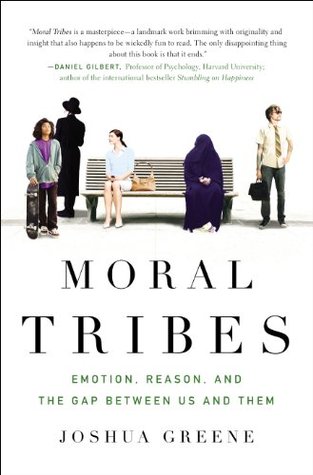More on this book
Community
Kindle Notes & Highlights
Read between
November 29 - December 22, 2017
And liberals, according to Haidt, have exceptionally bad tongues. They can easily “taste” caring, fairness, and liberty, but they can barely taste loyalty, authority, and sanctity.
Wow, this an tremendously uncharitable and unwise reading. Greene is implicitly giving equal moral weight to all criteria without any consideration.
Haidt’s answer, once again, is that liberals have impoverished moral tongues, with half of their moral taste receptors severely weakened.
Where is this sourced? It's been a long time since I read Haidt, but i don't remember concepts akin to "impoverished". Did I ignore that, or did Greene assume it?
The government has no right to tell people what they can or can’t do. And so on. I reject this view, for reasons already given: We have no non-question-begging way of knowing who has which rights.
hypothetical questions . . . widely underappreciated: For an excellent discussion of the allergy to hypothetical questions, see Kinsley (2003).
One can imagine an immense warehouse full of trillions of rabbits whose brains are hooked up to stimulators that intermittently produce mild levels of rabbit gratification. What each rabbit gets is not that great, but there are so many rabbits. Thus, utilitarian revolutionaries could, in principle, justify destroying our world in order to realize their dream of building an enormous rabbit gratification factory.
“illusion of explanatory depth”: Rozenblit and Keil (2002); Keil (2003). applied this idea to politics: Fernbach, Rogers, et al. (in press). left their strong opinions intact: The demand for reasons did moderate some people’s views, but these tended to be people who couldn’t produce any reasons at all when asked.
Thomson (1985, 1990). Note that Thomson has changed her mind and now thinks that it’s wrong to turn the trolley (Thomson, 2008).
As evolutionary psychologists have pointed out (Miller and Todd, 1998), what we find sexually attractive is typically indicative of high reproductive potential.
Dunbar, R. I. M. (2004). Gossip in evolutionary perspective. Review of General Psychology 8(2): 100. Dunbar, R. I. M., A. Marriott, et al. (1997). Human conversational behavior. Human Nature 8(3): 231–246.
Dutton, D. G., and A. P. Aron (1974). Some evidence for heightened sexual attraction under conditions of high anxiety. Journal of Personality and Social Psychology 30(4): 510.
Fernbach, P. (2012, May 27) Weak evidence. WAMC Northeast Public Radio. Fernbach, P. M., T. Rogers, C. R. Fox, and S. A. Sloman (in press). Political extremism is supported by an illusion of understanding. Psychological Science.
Foot, P. (1967). The problem of abortion and the doctrine of double effect. Oxford Review 5: 5–15.
Kinsley, M. (2003, October 2). Just supposin’: In defense of hypothetical questions. Slate. Retrieved from http://www.slate.com/articles/news_and_politics/readme/2003/10/just_supposin.html
Miller, G. F., and P. M. Todd (1998). Mate choice turns cognitive. Trends in Cognitive Sciences 2(5): 190–198.
Nisbett, R. E., and D. Cohen (1996). Culture of honor: The psychology of violence in the South. Boulder, CO: Westview Press. Nisbett, R. E., K. Peng, et al. (2001). Culture and systems of thought: Holistic versus analytic cognition. Psychological Review 108(2): 291. Nisbett, R. E., and T. D. Wilson (1977). Telling more than we can know: Verbal reports on mental processes. Psychological Review 84(3): 231.
Sloman, S. (1996). The empirical case for two systems of reasoning. Psychological Bulletin 119(1): 3–22. Sloman, S., Fernbach, P. M. (2012). I’m right! (For some reason). New York Times. Retrieved November 8, 2012, from http://www.nytimes.com/2012/10/21/opinion/sunday/why-partisans-cant-explain-their-views.html?_r=0.
Thomson, J. (1985). The trolley problem. Yale Law Journal 94(6): 1395–1415. Thomson, J. (2008). Turning the trolley. Philosophy and Public Affairs 36(4): 359–374. Thomson, J. J. (1976). Killing, letting die, and the trolley problem. The Monist 59(2): 204–217.


